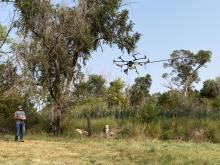DRONES BEING USED TO SPRAY HARD-TO-REACH INVASIVE SPECIES ALONG REPUBLICAN RIVER
DRONES BEING USED TO SPRAY HARD-TO-REACH INVASIVE SPECIES ALONG REPUBLICAN RIVER
The Upper and Middle Republican Natural Resources Districts and Southwest Weed Management (SWWM) have partnered together to tackle invasive weed species throughout the URNRD and along the Republican River Basin.
One of the targeted noxious weed species is the non-native phragmites that can consume large amounts of water along riverbeds.
To better reach hard-to-access areas where the noxious weed is growing, SWWM is using drones to do the spraying.
They have received grant funding from the Nebraska Environmental Trust and the Nebraska Department of Agriculture to cover the cost of spraying along the river.
However, there was a large area containing the weed species that needed to be sprayed in Dundy County but it was too far away from the river to be covered by the grant so the spraying was done with funds provided by the URNRD.
The Upper and Middle Republican NRDs provided financial support to SWWM to help prevent the spread of invasive species and to aid the flow of the Republican River and its tributaries.
SWWM Project Coordinator Jim Bowen contracted drone pilot Wesley Prosser of Lamar to do the spraying.
Last week, they were in Benkelman spraying a dried-up pond that had been overtaken by phragmites.
Using a drone not only helps spray hard-to-reach areas. It also allows for better and more direct spray coverage, minimizing the damage to surrounding vegetation.
Prosser operates his drone by sight and can cover up to a 20-foot span when using the drone booms.
While the pond was a relatively simple area to spray, Prosser and Bowen had been operating on cliffs and in trees the day before, where spray helicopters couldn’t reach—another advantage of using a drone.
The SWWM surveys rivers and creeks for the weed species. Bowen also stressed the importance of landowners reporting the presence of phragmites on their land so that a course of action to eliminate the weeds can be established.
County weed superintendents also help identify areas where spraying is needed.
Non-native phragmites aren’t the only invasive plant species SWWM is spraying.
They are working with the Twin Valley Weed Management, which covers the lower, downstream portion of the Republican River Basin, to integrate programs to eliminate Salt Cedar trees along the Republican River and its tributaries.
Contractors work with both districts to be more effective in their measures.
SWWM has an Eastern Red Cedar and Russian Olive Tree removal program where they cover 50% of the cost.
Landowners who believe they have either of these invasive tree species, phragmites or Salt Cedar trees and would like more information on the programs, contact Jim Bowen at swwmjb@outlook.com or by phone at 308-920-2410.




